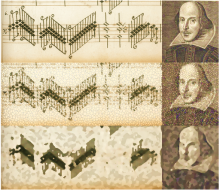Colloquium and Concert Commemorating the 400th Anniversary of Shakespeare's Death
Four centuries after the death of William Shakespeare, the Bard continues to influence scholarship and culture in profound ways, as music history professor JoAnn Taricani has discovered while exploring the significant role of music in the plays of Shakespeare and the ways we use music to remember Shakespeare and his characters.
“As scholars have shown, well-known songs, instrumental tunes, and ballads were an essential part of the fabric of Shakespeare’s plays,” Taricani says. “Even a brief textual reference prompted audiences to remember a ballad’s tune and full text, a process of remembering that we are learning to recreate through scholarship and performance.”
Both scholarship and performance will be central to “Shakespeare, Music, and Memory,” a colloquium organized by Taricani with support from the UW Simpson Center for the Humanities, the UW’s Royalty Research Fund, and the UW School of Music. The conference, April 29 at the School of Music, gathers scholars from universities nationwide to explore the role of memory and music in Shakespeare’s plays.
Plenary speakers— Linda Phyllis Austern (Northwestern University), Stephen Orgel (Stanford University), and Amanda Eubanks Winkler (Syracuse University)—will address the intersections among music, performance, and memory as played out in the dramas of Shakespeare and his contemporaries.
The colloquium concludes with 5 pm performance by the UW’s Collegium Musicum, an early music ensemble Taricani leads at the School of Music. The concert will present music from “The Jubilee,” a play and festival about Shakespeare produced in 1769. The music has been recreated in a modern edition by Taricani, and this appears to be the first performance of these songs about Shakespeare in almost 250 years. The concert will be illustrated with images from the Jubilee celebration in Stratford-upon-Avon, will present songs about Shakespeare, such as “Sweet Willie O!” and “All this for a poet,” written as part of the extravagant festival organized by the Shakespearean actor David Garrick in 1769. Performers include UW visiting scholar Linda Tsatsanis, UW graduate student Emerald Lessley, lutenist John Lenti, and recent UW doctoral graduate Nathan Whittaker on baroque cello.
“Garrick’s 1769 festival was a turning point in remembering Shakespeare,” Taricani noted. “It was intended to enhance the reputation of both Garrick and Shakespeare, but the three-day event was flooded by the River Avon, ruining Garrick’s plans to showcase the characters and costumes of Shakespeare’s plays. So, he re-wrote the celebration as a play and pageant that had over 90 performances at the Drury Lane Theatre in London in 1769-70. These public celebrations of Garrick started the movement known as ‘Bardolatry,’ the popular adulation of Shakespeare that we still enjoy today.”
Popular musical references are a key point of interest for Taricani, who has been exploring, with support from the UW’s Royalty Research Fund, the “invisible” music of the 1600s, and the ways that the sound of music communicate remembrance and association of people and ideas.
The colloquium, part of the worldwide celebration of the 400th anniversary of the death of Shakespeare, coincides with several events in Seattle, an exhibition at Seattle Public Library of one of the rare First Folio editions of Shakespeare’s plays, on loan from the Folger Shakespeare Library March 21-April 17, 2016.
A list of related Seattle events as well as more information about “Shakespeare, Music, and Memory,” are at http://shakespearesmusic.com/.
Schedule for Shakespeare: Music and Memory
Friday, April 29, 2016
11-11:45 a.m.,
Michael Graham, Royal Holloway, University of London: “Shakespeare and British Opera: Music and Memory in The Knot Garden (1970)”
Simpson Center for the Humanities, Room 202 (Communications Building)
1-1:45 p.m.
Stacey Jocoy, Texas Tech University: “John Playford and the Imagined Memory of a Royalist Shakespeare”
Music Building, Room 223
1:45-2:30 p.m.
Amanda Eubanks Winkler, Syracuse University: “A Thousand Voices: Performing Ariel”
Music Building, Room 223
2:30-3:15 p.m.
Linda Phyllis Austern, Northwestern University: “Music, Memory, and Shakespearean \Theatricalities in Francis Beaumont’s Knight of the Burning Pestle”
Music Building, Room 223
4:00-5:45, Music Building, Brechemin Auditorium (Room 126)
4-5 p.m.
Stephen Orgel, Stanford University: “Shakespeare and/or Music”
Music Building, Brechemin Auditorium (Room 126)
5-5:30 p.m.
Concert: “The Shakespeare Jubilee of 1769.”
A concert with images of the Jubilee by the UW Collegium Musicum, JoAnn Taricani, director. Performers include UW visiting scholar Linda Tstasanis, UW graduate student Emerald Lessley, and lutenist John Lenti, among others.
Brechemin Auditorium, School of Music
All presentations and discussions are open to members of the campus and public without charge. More details are available at shakespearesmusic.com.
